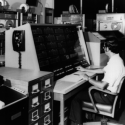Reproducibility is one of the cornerstones of science. Made popular by British scientist Robert Boyle in the 1660s, the idea is that a discovery should be reproducible before being accepted as scientific knowledge. For most of the history of science, researchers have reported their methods in a way that enabled independent reproduction of their results. But, since the introduction of the personal computer – and the point-and-click software programs that have evolved to make it more user-friendly – reproducibility of much research has become questionable, if not impossible. Too much of the research process is now shrouded by the opaque use of computers that many researchers have come to depend on. This makes it almost impossible for an outsider to recreate their results.
Editors’ Choice: How Computers Broke Science and What We Can Do to Fix It

